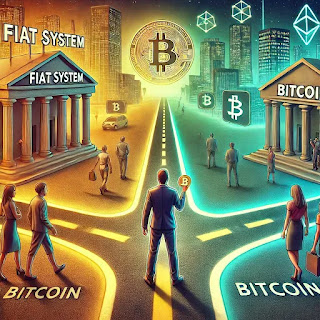The Evolution of Trust: From Institutions to Protocols
Trust isn’t just a nice-to-have; it’s the invisible engine behind every society, every system, and every single human interaction. From the earliest days of tribal living to the sprawling financial empires of today, trust has been the bridge between uncertainty and action. But what happens when that bridge starts to crumble?
We are living through a quiet revolution. Not one of bullets or protests, but one of code. And at the center of it stands Bitcoin, the first monetary system where trust isn’t outsourced, but embedded in the protocol itself. To understand why that matters, we have to trace the journey of trust itself.
Tribal Roots: Skin in the Game
In early human tribes, trust was visceral. You trusted your neighbor because you knew them. Betrayal had consequences. You couldn’t ghost a tribe and start fresh. This kind of trust was built on proximity, shared experience, and the very real risk of exile or punishment.
It was personal. It was sacred. And it worked, until scale demanded something more.
Scaling Trust with Institutions
As societies grew, we needed scalable systems of coordination. Enter institutions. Governments, religious authorities, banks—all arose to act as intermediaries of trust. These entities said, “We’ll handle this. You can trust us.”
And for a while, it worked. Trade flourished, laws stabilized, wealth accumulated. But with centralized power came inevitable flaws: greed, corruption, censorship, inequality. Trust became a commodity. A business. A tool of control.
The Fracture Point: Institutional Decay
Now we live in a world where institutions are cracking under their own weight. Politicians lie. Banks gamble with your future. Corporations prioritize profit over truth. Faith in centralized systems is eroding fast.
People feel it. They see the fine print, the double standards, the rigged rules. They’re not just losing trust in institutions. They’re losing the very concept of trust itself.
But what if trust didn’t have to be personal? What if it didn’t require faith in fallible humans? What if we could design trust into the system?
Enter Open-Source: Trust in Transparency
That’s where open-source steps in. Open-source software is radically transparent. Anyone can inspect the code, propose changes, or fork it entirely. It doesn’t ask for your belief. It shows you the blueprint.
You don’t trust a corporation. You don’t trust a spokesperson. You trust the protocol because you can verify it for yourself.
Linux: The Silent King of the Digital World
Want proof that open-source works? Look at Linux. It’s the operating system powering most of the internet. It runs on servers, supercomputers, phones, and even space tech. Most people use Linux-based systems every day without even knowing it.
Linux didn’t win because of flashy marketing. It won because it worked. Because people could see it, improve it, and build on it. That’s the quiet power of transparency.
Bitcoin: The Apex Evolution of Trust
Now take that same open-source model and apply it to money. That’s Bitcoin.
No CEO. No central bank. No backroom deals. Just open-source code running on thousands of nodes around the world, enforcing the same transparent rules for everyone. You don’t need to ask permission. You don’t need to trust anyone. You can audit the entire system yourself.
Bitcoin is what happens when we stop trusting banks to hold our wealth and start trusting math, consensus, and time-tested code.
It’s not just a financial tool. It’s a trust protocol.
A New Trust Paradigm
We’re witnessing the birth of a new form of trust. One that doesn’t rely on authority figures or legacy institutions, but on protocols that anyone can audit, challenge, and improve.
Bitcoin isn’t here to destroy trust. It’s here to upgrade it. To take it out of the shadows and into the light. To give it back to the people.
This isn’t about going backward to tribalism. It’s about going forward to something more resilient, more open, more human. Because it’s built by humans, for humans, without needing to trust any single one of them.
Welcome to the new trust economy.
Bitcoin is the proof.




Comments
Post a Comment